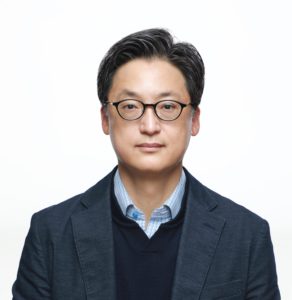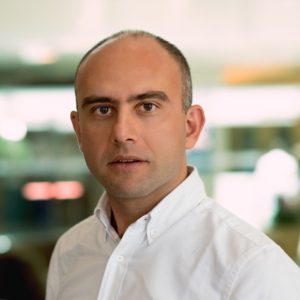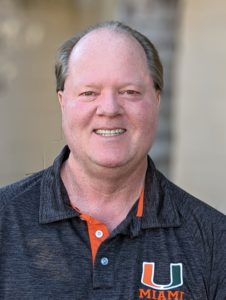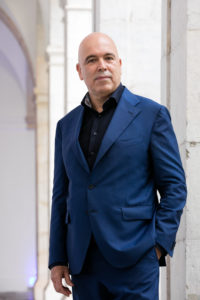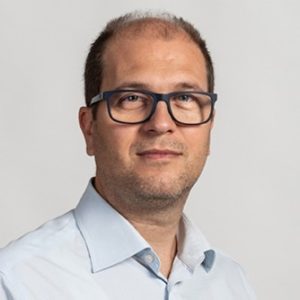Keynote 1: “Towards a global 6G standard for a sustainable digital society – Use Cases and Enabling Technologies”
Monday, November 28, 09:10 AM – 10:00 AM Athens time
Room: ZEUS AB
Riccardo Trivisonno, Head of Network Architecture – Research and Standardisation, Huawei and Chairman of 6G-IA Pre-standardization WG
Abstract: one6G association is a non-profit organization founded in 2021, aiming at accelerating research in Europe towards a global 6G standard for a sustainable digital society. This talk will provide a concise and insightful summary of the techno-scientific results the association achieved over the past 12 months. From an analysis of Vertical use cases, key requirements have been derived, calling for evolution and enhancements of communication systems. A set of enabling technologies have then been identified and discussed, as candidate pillars on which 6G founding principles will be built.
Bio: Riccardo Trivisonno (Senior Member, IEEE) joined Huawei Technologies in 2011 and is currently serving as Head of Network Architecture – Research and Standardisation – for the Advanced Wireless Technologies Laboratory, at Munich Research Center. He has been Chairman of 6G-IA Pre-standardization WG since 2020 and Board Member of One6G Association since its foundation, in 2021. Over the past ten years, his team strongly contributed to the definition and the standardisation of 5G network architecture and technologies for 3GPP Releases 15, 16 and 17 – in the areas of architecture modularization, network slicing, network analytics and QoS for verticals, filing ~100 Standard Essential Patent applications. The research team has been focusing on 6G enabling technologies since 2020. He received his Ph.D and M.Sc. degrees in telecommunications engineering from the University of Bologna in 2005 and 2000, respectively.
Keynote 2: “ 6G towards “The Next Hyper-Connected Experience for All””
Tuesday, November 29, 09:00 AM – 10:00 AM Athens time
Room: ZEUS AB
Sunghyun Choi, Executive Vice President, Head of Advanced Communications Research Center, Samsung Research, Samsung Electronics
Abstract: Since the first commercial launch in 2019, 5G has grown to be the core infrastructure for a wide range of industries. Future communication networks will require not only more powerful network equipment with vast amount of information processing but also softwarization of communication technologies to make equipment flexible with lower costs. To overcome current technical challenges, strengthening the function of software and developing AI will be top priority, and furthermore research activities are essential to build 6G, the next-generation communication system, in both academia and industry. In this talk, I will first present the evolution of 3GPP 5G standards towards 5G-Advanced, and then discuss various aspects such as mega trends, services, requirements, candidate technologies towards 6G as a next-generation communication system along with the current development status within Samsung Research.
Bio: Sunghyun Choi is an Executive Vice President and Head of the Advanced Communications Research Center at Samsung Research, Samsung Electronics, Seoul, Korea. He was a Professor at the Department of Electrical and Computer Engineering, Seoul National University (SNU), Seoul, Korea from Sept. 2002 to Aug. 2019, and served as a Vice Dean for Academic Affairs, College of Engineering during the last two years at SNU.
He received his B.S. (summa cum laude) and M.S. degrees in electrical engineering from Korea Advanced Institute of Science and Technology (KAIST) in 1992 and 1994, respectively, and received Ph.D. at the Department of Electrical Engineering and Computer Science, The University of Michigan, Ann Arbor in 1999. He is currently leading researches and standardization for 6G, 5G-Advanced, and IoT connectivity at Samsung Research. He has been giving keynote speeches at various conferences including IEEE ICC, IEEE VTC, IEEE CCNC, and ACM MobiHoc. He co-authored over 250 technical papers and holds over 160 patents, and numerous patents pending. He has served as a Program Committee Co-Chair of IEEE WCNC 2020, IEEE DySPAN 2018, ACM Multimedia 2007, and IEEE WoWMoM 2007. He has served as an Editor of numerous publications including IEEE Transactions on Wireless Communications, IEEE Transactions on Mobile Computing, and IEEE Wireless Communications Magazine. He was named IEEE Fellow in 2014.
Keynote 3: “5G, 5G Advanced & the path to 6G”
Tuesday, November 29, 16:00 – 17:00 Athens time
Room: ZEUS AB
Lorenzo Casaccia, Vice President, Technical Standards & Intellectual Property, Qualcomm
Abstract: This talk will provide an overview of the foundational features of 5G, its evolution into various verticals and into 5G-Advanced and how this relates to the creation of 6G by incubating several future 6G concepts.
Bio: Lorenzo Casaccia has been at the forefront of wireless communication for over 20 years holding various positions in standards, research, industry and IP management in Qualcomm. He was responsible for the 4G & 5G standards team for over a decade. Most recently, he is responsible for 6G industry group and ecosystem at Qualcomm, and for the technology strategy of the Qualcomm licensing business. Lorenzo holds degrees in electrical engineering, telecommunications and philosophy, and is inventor or co-inventor of hundreds of approved patents.
Keynote 4: “ IEEE 802.15 Work Group for Wireless Specialty Networks”
Tuesday, November 29, 17:15 – 18:15 Athens time
Room: ZEUS AB
Clint Powell, Chair of IEEE 802.15 Work Group and IEEE 802.15.14 Task Group & Managing Director, Powell Wireless Commsulting
Abstract: IEEE 802.15 covers a wide breadth and depth of wireless technologies that are implemented in products that you may not even realize are using 802.15. 802.15 standards support simple point-to-point connectivity, ad-hoc mesh networks, and field area networks, with data rates from kb/sec to Gb/sec, covering ranges from under a meter to miles, supporting a battery life of several months to years, with some even utilizing energy harvesting. 802.15 contains a family of standards (distinctly different MACs), each offering a variety of PHYs to suit the various needs of specific industry segments. IEEE 802.15 develops technologies such as narrow band ad-hoc networks, body area networks, high-speed server-based connectivity, optical wireless and optical camera communications, UWB ad-hoc networks – providing ranging accuracy down to a few cm, layer 2 routing, and key management protocols supporting a variety of consumer, commercial, and industrial based needs. IEEE 802.15 is continuously evolving to meet future wireless specialty network needs. In IEEE 802.15 we often say “… if it’s not Wi-Fi or Cellular it’s probably 802.15”.
Bio: Clinton C Powell is Chair of the IEEE 802.15 Work Group, Acting Chair of the 802.15.14 Task Group, and Vice-Chair of the 802.15.4ab Task Group. He has 30+ years of in-depth experience and knowledge in driving leading-edge wireless technologies. Over the past 20 years, Clint has participated (as Chair, Vice-Chair, Technical Editor, Contributor, and Reviewer) for numerous 802.15 standards. During this time, he has held and continues to hold numerous roles within the Connectivity Standards Alliance (f.k.a. Zigbee Alliance). Before this, he was the Global Systems Architecture Manager for the Wireless Connectivity Operations, a Member of the Technical Staff, and a Scientific Advisory Board Associate at Freescale (f.k.a. Motorola). Recently he has become involved in UWB technology including both the CCC and FiRa Consortiums, with roles in both. He is a respected, well-known leader in standards bodies and business alliances and is sought after in the Emerging Wireless IoT and Smart Energy Communications Industries by chip makers, product manufacturers, end customers, and system deployers on a variety of concerns, system definitions, standards clarifications, and real-world product deployment performance issues. He has authored many internal papers, and several conference papers, and holds 36 US patents in wireless communications.
Keynote 5: “IEEE- SA : Paving the Path for Future Technology”
Tuesday, November 29, 16:15 – 17:00 Athens time
Room: Virtual in Zoom
Konstantinos Karachalios, Managing Director of the IEEE Standards Association (IEEE SA)
Abstract: Wireless and Connectivity is the technology framework of the 21st century – the essential tech of the present and accelerated tech of the future to move our global community forward. Connectivity is the fabric for the next phase of digital transformation connecting virtually everything and thus unlocking new business opportunities and use cases. IEEE Standards Association (IEEE SA) Managing Director Dr.Ing Karachalios will speak about how IEEE SA is helping in the digital transformation revolution through its various programs and initiatives and how IEEE SA is addressing the opportunities and challenges of the future that lay ahead.
Bio: Konstantinos Karachalios, a globally recognized leader in standards development and intellectual property, is managing director of the IEEE Standards Association and a member of the IEEE Management Council. As managing director, he has been enhancing IEEE efforts in global standards development in strategic emerging technology fields, through technical excellence of staff, expansion of global presence and activities and emphasis on inclusiveness and good governance, including reform of the IEEE standards-related patent policy. As member of the IEEE Management Council, he championed expansion of IEEE influence in key techno-political areas, including consideration of social and ethical implications of technology, according to the IEEE mission to advance technology for humanity. Results have been rapid in coming and profound; IEEE is becoming the place to go for debating and building consensus on issues such as a trustworthy and inclusive Internet, in particular regarding age-appropriate design of internet platforms, and ethics in design of autonomous systems.
Before IEEE, Konstantinos played a crucial role in successful French-German cooperation in coordinated research and scenario simulation for large-scale nuclear reactor accidents. And with the European Patent Office, his experience included establishing EPO’s patent academy, the department for delivering technical assistance for developing countries and the public policy department, serving as an envoy to multiple U.N. organizations. Konstantinos earned a Ph.D. in energy engineering (nuclear reactor safety) and masters in mechanical engineering from the University of Stuttgart.
Keynote 6: “Making the future edge via standards: a MEC overview (and why it matters)”
Wednesday, November 29, 18:15 – 19:00 Athens time
Room: Virtual in Zoom
Dario Sabella, Senior Manager Standards and Research, Intel and Chairman ETSI ISG MEC
Abstract: The talk will provide an overview of ETSI MEC activities, in alignment with other standard bodies and industry associations, also for the evolution toward future systems. The MEC standardization will be discussed in perspective, as natural result of the industry need for standards when addressing interoperability in complex and heterogeneous environments, together with the complementary and growing role of open source (e.g. LF Edge) and other communities (e.g. 5GAA). In this perspective, a particular emphasis will be given to edge application developers engagement activities in MEC.
Bio: Dario Sabella works with Intel as Senior Manager Standards and Research, driving new technologies and edge cloud innovation for advanced systems, involved in ecosystem engagement and coordinating internal alignment on edge computing across standards and industry groups. In February 2021 has been elected as Chairman of ETSI MEC (Multi-access Edge Computing), while from 2019 he was serving as vice-chairman, previously Lead of Industry Groups, and from 2015 vice-chair of IEG WG. Since 2017 he is also delegate of 5GAA (5G Automotive Association) and Lead of gMEC4AUTO in 5GAA. Before 2017 he worked in TIM (Telecom Italia group), as responsible in various research, experimental and operational activities on OFDMA technologies (WiMAX, LTE, 5G). He is Innovation Manager at 6G Flagship EU project Hexa-X. Author of several publications (40+) and patents (30+) in the field of wireless communications, energy efficiency and edge computing, Dario is IEEE senior member and has also organized several international workshops and conferences.




